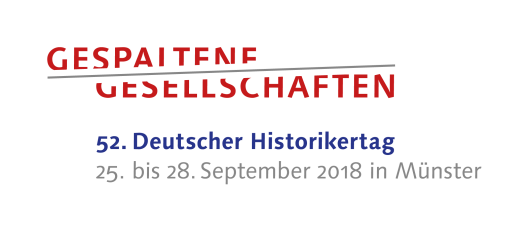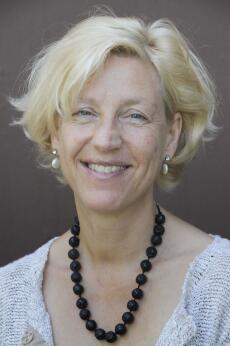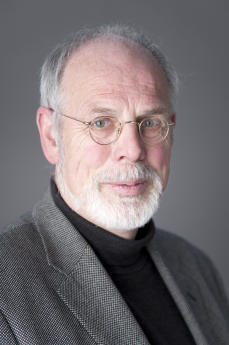“Divisions in society are nothing new historically”
52nd Meeting of German Historians in Münster in September “Divided Societies” – “Democracies perceive divisions as dangerous – but historically, they often proved productive” – Europe’s largest humanities congress – With lectures by Wolfgang Schäuble, Christopher Clark, Herfried Münkler, Ulrich Raulff, Aladin El-Mafaalani, Birgit Schäbler – Guest country, the Netherlands, represented by parliamentary president Khadija Arib and author Geert Mak
Press release of the Cluster of Excellence from 17 August 2018

According to historians, societies have repeatedly experienced deep divisions in history, not just since the current refugee crisis. “As a result, however, they often continued to develop productively,” states medieval historian Prof. Dr. Eva Schlotheuber and ancient historian Prof. Dr. Peter Funke. “Social, economic, religious or ethnic divisions are not a peculiarity of our time, but have been a challenge in all epochs and regions of the world.” The historians announced the 52nd Meeting of German Historians, which the Association of German Historians (VHD) will be holding under the motto “Divided Societies” at the University of Münster from 25 to 28 September. At the opening of the Meeting of German Historians, Wolfgang Schäuble (CDU), President of the German Bundestag, and his Dutch counterpart Khadija Arib, Speaker of the House of Representatives, will talk about divided societies. Schäuble sees the social cohesion in jeopardy “in many places”, as he writes in his greeting. However, that which is unifying may emerge when a society is “concerned with what is dividing”.
“In democracies, whether ancient or modern, divisions are always perceived as dangerous,” says VHD Chair Prof. Schlotheuber. In the face of countless crucial political and social tests, the topic of Europe’s largest congress in the humanities is highly topical. “Social inequality, cultural and religious conflicts, or new forms of nationalism that respond to globalisation are dividing societies today. The Meeting of German Historians will show the historical depth dimension of the processes in order to increase the understanding of current crucial tests.” This is done by means of many case studies – from migration debates from antiquity to pre-modern forms of “hate speech” to the rise of the “New Right” in Europe.

“In history, societies have time and again seen the foundations of their coexistence on trial,” explains Prof. Funke, speaker of the Meeting of German Historians’ Committee in Münster. “Divisions that seemed insurmountable were more the rule than the exception.” Permanent civil wars had been a socio-political constant in the Greek state world of antiquity and had advanced debates on the best political order. “The confessional divisions of the early modern period led to long upheavals even in the communities, while the dictatorships and wars of the 20th century often forced a unity that merely covered up differences with blood.” Both outside and within Europe, colonisation brought about social upheavals and inequalities which even decolonisation has not been able to pacify. Even today, many people still have the feeling that the traditional consensus is at risk. Moreover, tensions in a globalised world have an international impact. “Divisions between rich and poor and between ‘foreign’ and ‘indigenous’ make the feeling of participation and justice disappear so that groups that propagate simple solutions are able to convince.”
From ancient migration debates to the Hartz concept and “helicopter parents”
At the 52nd Meeting of German Historians, in more than 90 sections, some 3,500 scholars from Germany and abroad will deal with current research on the multifaceted phenomena of social divisions. Among the topics discussed will be, for example, refugee debates from antiquity to the present; a social, economic and legal exclusion of certain groups occurring in all epochs; the question whether the Peace of Westphalia is a model for the Middle East; economic divisions in Germany, for example between “Hartz IV families and helicopter parents”; or the political instrumentalisation of historical images in today’s divided societies such as Catalonia, Scotland and Kosovo. Historians of all epochs and sub-disciplines will also discuss how utopias and worldviews competed in societies and how differently the epochs have dealt with this.

“That democracies like ours are particularly sensitive to conflicts and divisions is due to the public negotiation of decisions: every vote counts, at least theoretically,” explains VHD Chair Prof. Schlotheuber. However, the democratic struggle of social forces in view of obvious divisions has, time and again, triggered productive developments. The rebellion of the middle and lower classes in medieval cities, for example, gave the municipal constitution a future-proof shape. “Autocratic and dictatorial systems, on the other hand, tend to shut themselves off in order to cover divisions and to demonstrate unity and strength to the outside world.” It has been particularly conflict-prone when several divisions meet in societies, as Prof. Funke adds, “when, for example, economic, ethnic and religious disputes get confounded”. According to Prof. Schlotheuber, the poverty movement of the High Middle Ages around personalities such as Francis of Assisi had been of such complexity, “which, with its demand for voluntary poverty and practical charity, became a crucial test for society. It put pressure on the official church and the upper class. However, the idea could not be extinguished and enriches societies to this day.”
The historian emphasises that the science of history cannot provide simple solutions to today’s challenges. “But it can place them in the complex processes since the beginning of human history in which similar challenges had to be overcome. Without historical knowledge, we would have to start over and over again in the debates about immigration, religious differences or national identity.” In addition, the examination of earlier societies, which are “often foreign to us”, helps to find an appropriate way of dealing, in the globalised world, “with cultures that are also foreign and often follow completely different principles from our own”. (sca/vvm)

